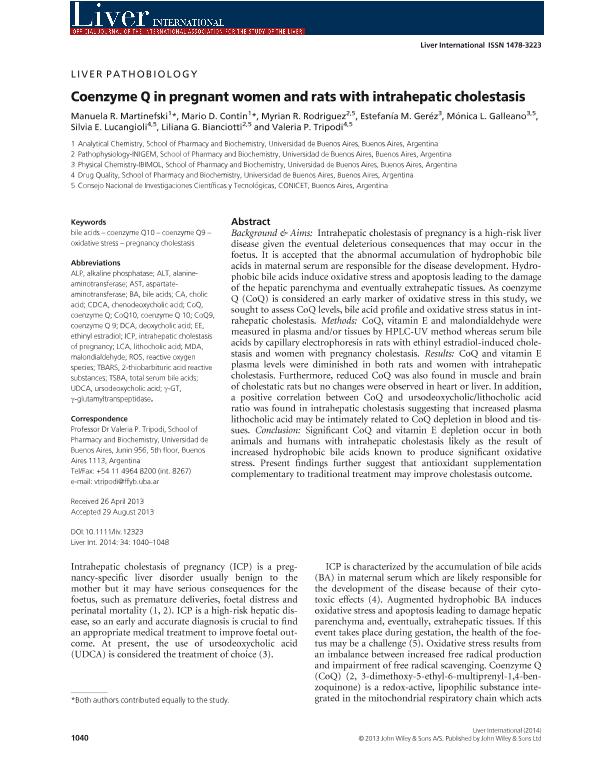Artículo
Coenzyme Q in pregnant women and rats with intrahepatic cholestasis
Martinefski, Manuela Romina ; Contin, Mario Daniel
; Contin, Mario Daniel ; Rodriguez, Myrian Roxana
; Rodriguez, Myrian Roxana ; Geréz, Estefanía M.; Galleano, Mónica Liliana
; Geréz, Estefanía M.; Galleano, Mónica Liliana ; Lucangioli, Silvia Edith
; Lucangioli, Silvia Edith ; Bianciotti, Liliana Graciela
; Bianciotti, Liliana Graciela ; Tripodi, Valeria Paula
; Tripodi, Valeria Paula
 ; Contin, Mario Daniel
; Contin, Mario Daniel ; Rodriguez, Myrian Roxana
; Rodriguez, Myrian Roxana ; Geréz, Estefanía M.; Galleano, Mónica Liliana
; Geréz, Estefanía M.; Galleano, Mónica Liliana ; Lucangioli, Silvia Edith
; Lucangioli, Silvia Edith ; Bianciotti, Liliana Graciela
; Bianciotti, Liliana Graciela ; Tripodi, Valeria Paula
; Tripodi, Valeria Paula
Fecha de publicación:
08/2014
Editorial:
Wiley
Revista:
Liver International
ISSN:
1478-3223
Idioma:
Inglés
Tipo de recurso:
Artículo publicado
Clasificación temática:
Resumen
BACKGROUND & AIMS: Intrahepatic cholestasis of pregnancy is a high-risk liver disease given the eventual deleterious consequences that may occur in the foetus. It is accepted that the abnormal accumulation of hydrophobic bile acids in maternal serum are responsible for the disease development. Hydrophobic bile acids induce oxidative stress and apoptosis leading to the damage of the hepatic parenchyma and eventually extrahepatic tissues. As coenzyme Q (CoQ) is considered an early marker of oxidative stress in this study, we sought to assess CoQ levels, bile acid profile and oxidative stress status in intrahepatic cholestasis. METHODS: CoQ, vitamin E and malondialdehyde were measured in plasma and/or tissues by HPLC-UV method whereas serum bile acids by capillary electrophoresis in rats with ethinyl estradiol-induced cholestasis and women with pregnancy cholestasis. RESULTS: CoQ and vitamin E plasma levels were diminished in both rats and women with intrahepatic cholestasis. Furthermore, reduced CoQ was also found in muscle and brain of cholestatic rats but no changes were observed in heart or liver. In addition, a positive correlation between CoQ and ursodeoxycholic/lithocholic acid ratio was found in intrahepatic cholestasis suggesting that increased plasma lithocholic acid may be intimately related to CoQ depletion in blood and tissues. CONCLUSION: Significant CoQ and vitamin E depletion occur in both animals and humans with intrahepatic cholestasis likely as the result of increased hydrophobic bile acids known to produce significant oxidative stress. Present findings further suggest that antioxidant supplementation complementary to traditional treatment may improve cholestasis outcome.
Palabras clave:
Coenzyme Q10
,
Coenzyme Q9
,
Oxidative Stress
,
Pregnancy Cholestasis
,
Bile Acids
Archivos asociados
Licencia
Identificadores
Colecciones
Articulos(IBIMOL)
Articulos de INSTITUTO DE BIOQUIMICA Y MEDICINA MOLECULAR
Articulos de INSTITUTO DE BIOQUIMICA Y MEDICINA MOLECULAR
Articulos(INIGEM)
Articulos de INSTITUTO DE INMUNOLOGIA, GENETICA Y METABOLISMO
Articulos de INSTITUTO DE INMUNOLOGIA, GENETICA Y METABOLISMO
Articulos(OCA HOUSSAY)
Articulos de OFICINA DE COORDINACION ADMINISTRATIVA HOUSSAY
Articulos de OFICINA DE COORDINACION ADMINISTRATIVA HOUSSAY
Citación
Martinefski, Manuela Romina; Contin, Mario Daniel; Rodriguez, Myrian Roxana; Geréz, Estefanía M.; Galleano, Mónica Liliana; et al.; Coenzyme Q in pregnant women and rats with intrahepatic cholestasis; Wiley; Liver International; 34; 7; 8-2014; 1040-1048
Compartir
Altmétricas



